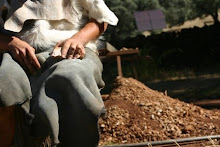14TH ANNUAL CONFERENCE OF THE EUROPEAN ARCHAEOLOGISTS' ASSOCIATION
MALTA: 16-21 September, 2008
Prehistoric technology: Cognition and the act of artefact
production
Session organizers: George Dimitriadis, Maria Gurova & George Nash
Session Abstract
Archaeological theory and practice are often antagonistic. Nonetheless, despite the pragmatists’ reserves, theoretical terms such as ‘culture’ and ‘technology’ still stimulate scientific debates and scholarly curiosity.
Though apparently a package in its right, technology is indivisible from the culture in which it is embedded. As embodied in cultural material, objects articulate systems of intangible ideas and can be associated with patterns of behaviour. For example, how did prehistoric peoples act and react in this respect? What are the relations between technological “packages” and the cosmological views of particular actors (technicians) or cultural entities?
Representations result from experience and are guided by perception. Philosophers still ponder over the links between psycho-physical sensations and mental meanings. Social sciences associate patterns of perception and the production of knowledge with the social ordering of a chaotic world.
Interdisciplinary analytical models can help archaeologists to understand technica systems in general and in particular the physical aspects of tools and raw materials, thus furthering the fathoming of symbolic representations and social frameworks underpinning the everyday ‘struggle for life’.
This session invites scholars whose research agenda deals with the study of prehistoric material culture, that although can be deemed merely as a process of economy, has been impacted by socio-political and technological factors.
Programme:
1). P. Gnessuta (Pisa): The Epigravettian pointes à cran in Italian peninsula.
Technological and functional analysis within the context of European cultures
2). G. Nash (Bristol): Assessing the symbolic modes of production of Mesolithic
portable items
3). G. Ritchie, C. Bonsall (Edinburgh): The 'Obanian' Revisited: Interpreting Stone,
Bone and Antler Technologies in the Mesolithic of western Scotland"
4). N. Elenski (Sofia): Technological aspects of the "labrets" impacted by functional
and "religious" factors
5). M. Gurova (Sofia): Resilience and revival of tribulum inserts production:
cognitive insight of the prehistoric technology
6). A. Vianello (Oxford): Identities formed from technology: the case of the Late
Bronze Age Mediterranean
7). P. Chruszczewski (Wroclaw): Runic inscriptions as instances of proto-books
8). R. Bednarik (Melbourne): Cognition and palaeoart production
9). F. di Donato (Milano): Headrest: Functionality, art & symbolism
10). P. Bouissac (Toronto): Signs as artifacts: an examination of the Piette collection
11). D. Delfino (Tomar): Ceramics from Middle and Recent Bronze in Liguria:
Proposal of analytical model of formal typology and “chaîne opératoire”
12). R. Melini (Trento): “Doing" music without "making" musical instruments: a
prehistoric, actually contemporaneous, concept.
EXPERIMENTING THE PAST. THE POSITION OF
EXPERIMENTAL ARCHAEOLOGY IN THE ARCHAEOLOGICAL
PARADIGM OF THE 21ST CENTURY
Session Organizers: Dragos GHEORGHIU, Julia WIECKEN and Emannuela ZIMMERMANN
In the second part of the 20th century, experimental archaeology gradually grew as a subdiscipline of archaeology. It often finds a mixed acceptance in mainstream academia, as different people mean different things when they use the term ‘experimental archaeology’. Whereas many flint knapping experiments have greatly enhanced the understanding of the lithics chaînes - opératories of certain sites and traditions, house ‘re’-constructions are often criticised for reducing the complexity and potential variables found in the archaeological record.
Experimental archaeology has a vast potential to test our practical hypotheses. However it can also unlock the sense world of the past, as well as uncover problems and unforeseen aspects of our theoretical arguments. These issues need to be engaged with in an interdisciplinary way.
The present session intends to put together some of the current trends in European experimental archaeology, and will try to identify emergent original trends within the present paradigm. Theoretical papers are encouraged as well as traditional experimental case studies. We are especially interested in the way the young generation of European archaeologists approach experimental archaeology today and what the future of the discipline might hold.
Additionally we will encourage those who would like to present part of their experimental work in a workshop organised alongside the session.
PAPERS
Dr Marie-Yvane Daire et al.
CNRS, UMR 6566, Rennes, France
An archaeology of coastal salt industry : the inescapable part of experiments
Professor Dragos Gheorghiu
Centre of Research, National University of Arts, Bucharest, Romania
Building and deconstructing using fire
Dr Emília Pásztor
Matrica Archaeological Museum, Hungary
Experimenting ancient light and shadow interaction
Dr Jacqui Wood
Saveok Water Archaeology, Savok Mill, Greenbottom, Cornwall, UK
Daily practices of Prehistoric Europe during the Mesolithic/Neolithic transition





